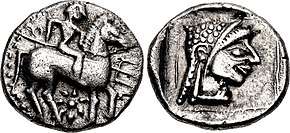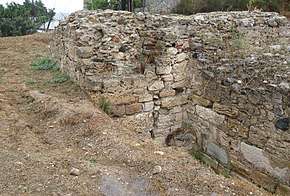Potidaea
Potidaea (/ˌpɒtɪˈdiːə/; Ancient Greek: Ποτίδαια, Potidaia, also Ποτείδαια, Poteidaia[1]) was a colony founded by the Corinthians around 600 BC in the narrowest point of the peninsula of Pallene, the westernmost of three peninsulas at the southern end of Chalcidice in northern Greece.[2]



History
While besieged by the Persians in 479 BC, the town may have been saved by a tsunami rather than a particularly high tide. [3] Herodotus reports how the Persian attackers who tried to exploit an unusual retreat of the water were suddenly surprised by "a great flood-tide, higher, as the people of the place say, than any one of the many that had been before".[4] In 2012 researchers from Aachen University announced that they had discovered evidence that the area should be included among Greek regions prone to tsunamis.[5]
Tsunami are generally associated with earthquakes, but Herodotus, the source of this story, makes no mention of an earthquake at the time. This makes it more likely that the event was a meteotsunami. Not only are such events relatively common in the Mediterranean, but their effect is amplified in a long, narrow body of water, which is a good description for the situation of Potidaea, which lies at the head of Toroneos Gulf.
During the time of the Delian League, conflicts occurred between Athens and Corinth. However, the Corinthians still sent a supreme magistrate each year. Potidaea was inevitably involved in all of the conflicts between Athens and Corinth. The people revolted against the Athenians in 432 BC, and it was besieged at the beginning of the Peloponnesian War and taken in the Battle of Potidaea in 430 BC.[6]
The Athenians retook the city in 363 BC, but in 356 BC Potidaea fell into the hands of Philip II of Macedon. Potidaea was destroyed and its territory handed to the Olynthians. Cassander built a city on the same site which was named Cassandreia. It was probably at this time that the canal, which still exists today, was dug through the sandy soil at the narrowest part of the isthmus, perhaps with the aim of making the city a naval base. In 43 BC a Roman colony was settled by the proconsul of Macedonia, which in 30 BC was resettled by Octavian (the future Augustus) and took the official name Colonia Iulia Augusta Cassandrensis.[7]
The modern settlement of Nea Poteidaia, built for refugees from Asia Minor after the First World War, is situated near this ancient site.
In popular culture, the fictional character Gabrielle from the TV series Xena: Warrior Princess was described as being from Potidaea.
See also
- Delian League
- Peloponnesian Wars
- List of ancient Greek cities
References
- Lund University. Digital Atlas of the Roman Empire.
- POTEIDAIA (Nea Poteidaia) Chalkidike, Greece, entry in The Princeton Encyclopedia of Classical Sites.
- Smid, T. C.: "'Tsunamis' in Greek Literature", Greece & Rome, 2nd Ser., Vol. 17, No. 1 (April 1970), pp. 100-104 (102f.)
- Herodotus, The Histories, 8.129
- "Persian invaders of Greece 'did perish in tsunami'". BBC News. 20 April 2012. Retrieved 22 April 2012.
-

- D. Samsaris,The Roman Colony of Cassandreia in Macedonia (Colonia Iulia Augusta Cassandrensis), Dodona 16(1), 1987, 353-362.
External links
| Wikimedia Commons has media related to Archaeological site of Potidaia. |